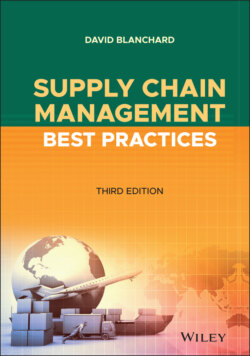Читать книгу Supply Chain Management Best Practices - David Blanchard - Страница 32
Everybody's Talking About Benchmarking
ОглавлениеHyundai has recognized two crucial facts that many companies unfortunately tend to gloss over when they try to evaluate their supply chain performance: (1) It's important to benchmark your supply chain against your peers to get a real-world evaluation of how good (or bad) you're doing, and (2) it's just as important that you recognize the limitations of a benchmark.
The biggest danger in benchmarking is assuming too much from any single study. Many benchmarking studies encompass companies and organizations of all shapes and sizes. Typically, if a company is better than the average, it declares victory and moves on. And if it's worse than the average, the usual rationalization is that it's being benchmarked against other industries, so it's not going to do as well in comparison. In short, the metrics end up being dismissed as irrelevant. This happens more often than you might think because while a lot of attention has been given to the idea of benchmarking, there's not much evidence that many companies are actually doing it.
Penn State's Center for Supply Chain Research, one of the nation's best-known supply chain programs, once sent out a survey to more than 1,200 supply chain executives asking how satisfied (or unsatisfied) they were with their supply chain benchmarking efforts, and they received barely a 10% response. Even members of the Supply Chain Council's SCOR board—a group whose very existence revolves around promoting the adoption of supply chain standards—initially ignored the survey, presumably because they thought they were being asked to fill out another benchmarking survey.10
According to the Penn State study, the number-one reason why companies don't undertake supply chain benchmarking actually isn't that these efforts take a lot of time to conduct (that was the number-four reason)—it's due to a lack of resources. Without enough people (and the right people) to participate in benchmarking activities, and without a sufficient budget, a company's efforts to benchmark its supply chain are doomed before the project even gets started.
The number-two reason is that internal measures and processes are difficult to define. If you don't know what you want to measure, then how can you discern if what you're doing is up to industry standards? As the saying goes, you can't manage what you can't measure. The third most prevalent deterrent to benchmarking is the difficulty in identifying proper benchmarking partners.
The prevailing attitude toward benchmarking is that the whole exercise falls somewhere in between “optional” and “pointless,” observes Jim Tompkins, chairman of supply chain consulting firm Tompkins International. But nothing, he emphasizes, could be further from the truth.
“While traditional, backward-looking ‘rate and rank' benchmarking is marginalized by the speed and scope of change, the need for process benchmarking—the identification of global best practices and adapting them to a different product or industry—is more important than ever,” Tompkins says. “These ideas are the potential disruptors that each company must either defend against or adapt in order to gain competitive advantage and create a disruption of their very own.” While some companies think of benchmarking as an exercise in continuous improvement, forward-thinking companies now look upon it as “the source for ongoing, transformational change.”11
